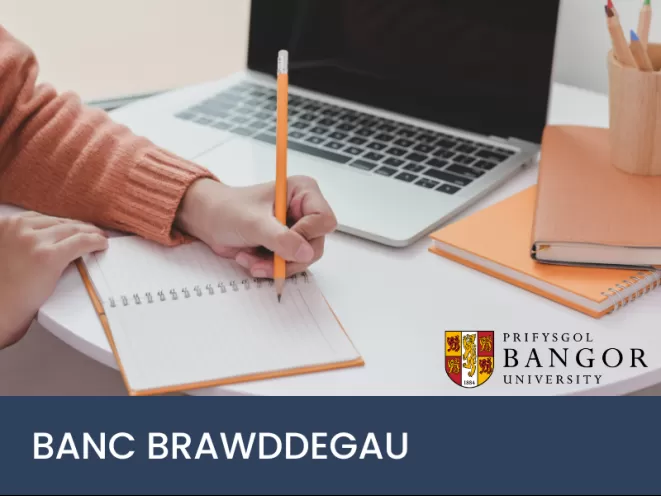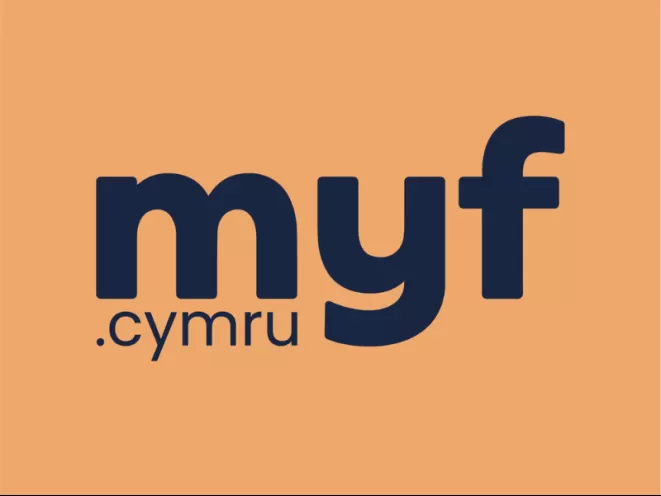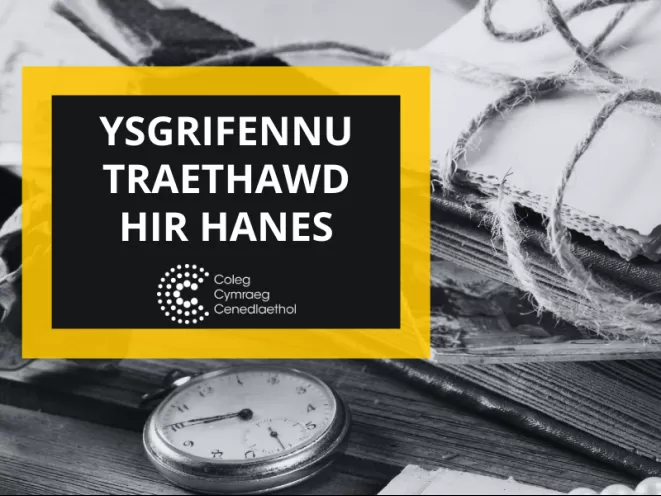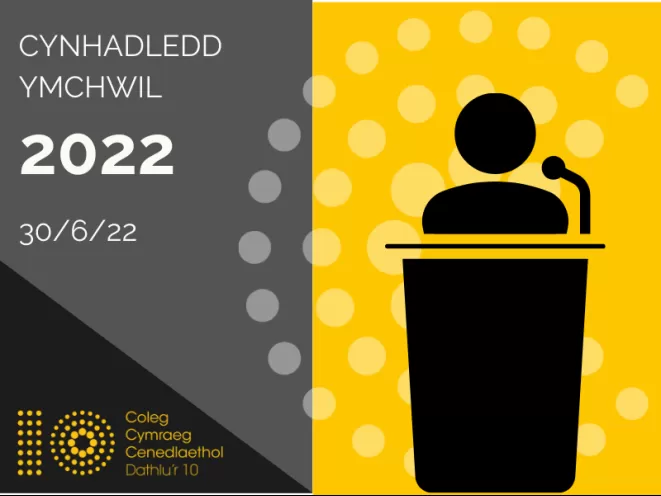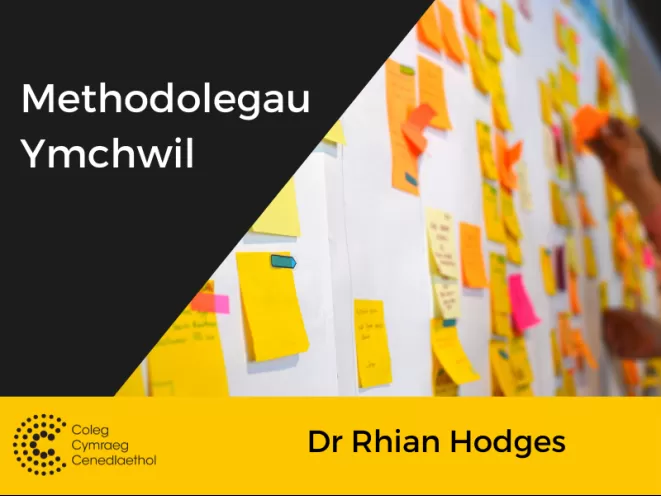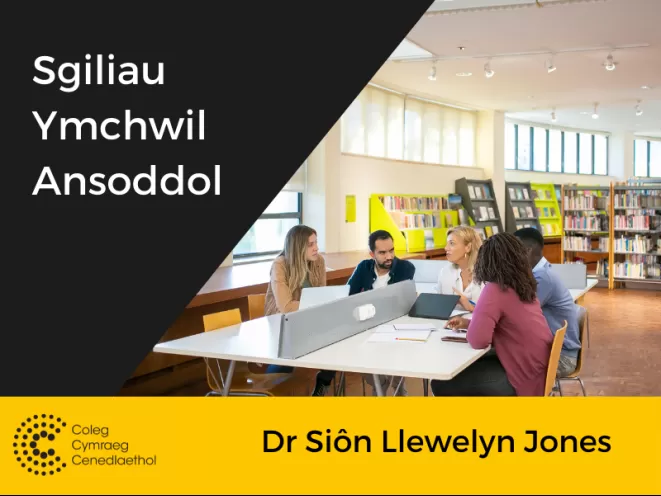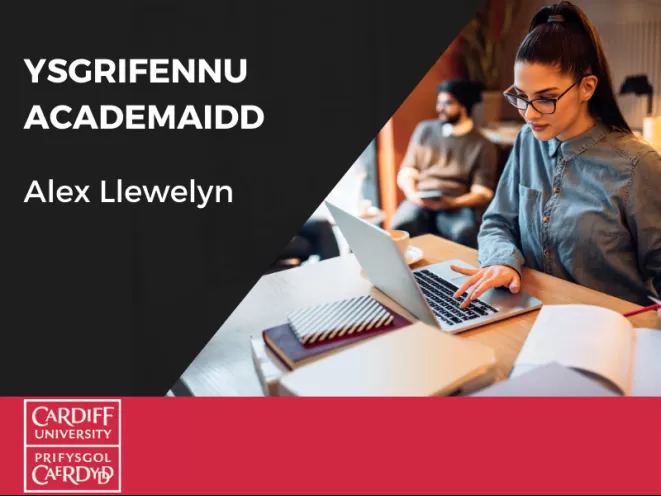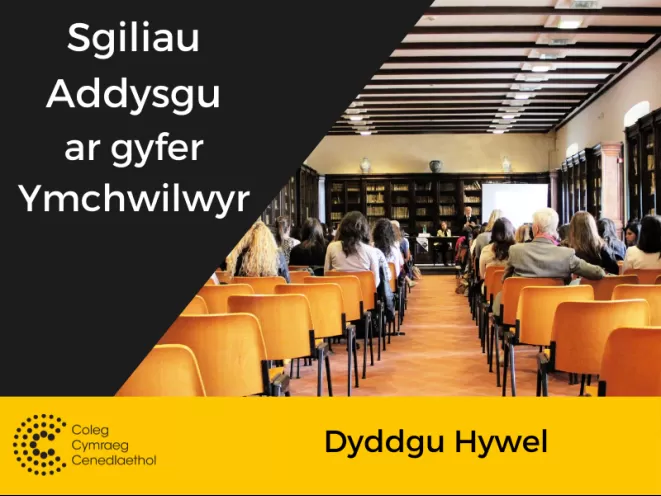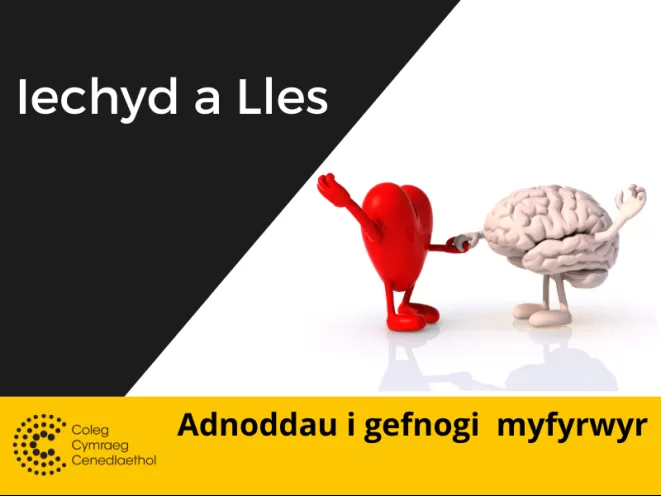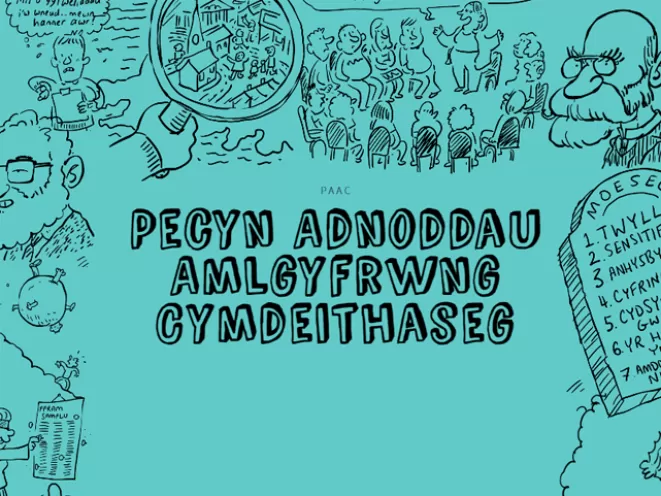Banc Brawddegau (Phrasebank) contains example phrases and sentences which can be used when writing a Welsh-medium essay, dissertation or academic paper. It is aimed at students and researchers, particularly those who may be new to Welsh-medium academic writing. Developed by Professor Enlli Thomas and Bethan Wyn Jones, Bangor University, based of Academic Phrasebank (https://www.phrasebank.manchester.ac.uk).
myf.cymru Website
myf.cymru is a Welsh language mental health and wellbeing project for students, which has created a website of the same name. The resources have been created in partnership with Bangor University, Aberystwyth University , University of Wales Trinity Saint David and Grŵp Llandrillo Menai. On the site, you will find original content from Welsh speaking students and also mental health resources that have been reviewed by Welsh speaking therapists. TMyf.cymru has worked in partnership with the MOIMR program to translate their app into Welsh. Full of useful and practical resources to support you on your recovery and will help anyone navigate the challenges of daily life. There is also a podcast called 'Sgwrs?' which covers issues that affect students today.
Traethawd Hir Hanes
Presentations on writing and researching for the History Dissertation module. What is a History Dissertation - Dr Lowri Ann Rees, Bangor University Researching Collections and Resources at the National Library of Wales online and at the Library The Medieval Age and Early Modern Period - Dr Rebecca Thomas, Cardiff University
Welsh-medium Research Conference 2022 (30 June 2022)
This Conference was held in a hybrid form this year, with an in-person audience at the National Library in Aberystwyth, and it was broadcast live to a virtual audience. The Coleg's annual Research Conference is for everyone who conducts and is interested in academic research through the medium of Welsh, whatever the field and whatever the discipline. Scientists, humanists and sociologists from all over Wales and beyond are invited to share the fruits of their research and to discuss with other like-minded Welsh researchers. The aim of the conference is to give the next generation of academics an opportunity to present their research before an audience of peers. The conference is also an opportunity to network with Welsh-speaking researchers and to foster a wider community of academics who promote Welsh-medium provision in our universities. Click below to see short presentations specially recorded for the conference. There are also links to view the research posters displayed during the conference. Recordings of the main presentations given live during the conference, and the question and answer sessions will be added below shortly.
Research Methodologies in the Arts and Humanities
The aims of these workshops is to: To introduce the main basics of Research Methods to postgraduate students with the following objectives: trace the history and origins of theories of research methodology; introduce the core concepts of research methods; offer various techniques of qualitative and quantitative research; key steps in creating a research plan. Content: These online workshops are split into three parts covering key research method concepts and key stages in creating a research plan. Part 1 - The purpose of social research: epistemology, ontology and empirical research; Part 2 - Research perspectives, strategies and questions Part 3 - Analyzing and interpreting data. Presenter: Dr Rhian Hodges Dr Rhian Hodges has been a Senior Lecturer in Sociology and Social Policy at the School of History, Law and Social Sciences at Bangor University for over a decade. She teaches Welsh-medium modules in education, sociology, language planning, sociology of music and research methods and loves teaching a wide range of different subjects through the medium of Welsh. Her specialist area of research is language planning, and in particular new Welsh speakers, community use of the Welsh language, and Welsh-medium education as a means of revitalizing the Welsh language in Wales. Originally from Bargoed, the Rhymney Valley, she has been living in Bangor for some time now. She's used to traveling up and down the A470 to see family and friends of the valleys. These workshops will benefit postgraduate students who are planning their dissertations and theses as it offers an opportunity to consider the critical stages of the research process and how it relates to their own research.
Qualitative Research Skills
The aims of these workshops is to: Introduce different types of qualitative methods Outline what needs to be considered before, during and after qualitative research is undertaken. Consider the ethical issues associated with qualitative research Outline how to analyse and present qualitative data. Content: Workshop 1 explores the different types of qualitative methods and creative methods. Workshop 2 looks at what needs to be considered when trying to access our research participants and before conducting the research. Workshop 3 focuses on what needs to be considered during and after conducting our research and the ethical issues associated with qualitative research. Workshop 4 looks at how to analyse and present qualitative data. Presenter: Dr Siôn Llewelyn Jones Siôn is a lecturer in the School of Social Sciences, Cardiff University. He has been developing Welsh-medium provision in the School and teaches on a number of modules, including research modules. Siôn has extensive experience of carrying out qualitative research. He has worked on a number of research projects for different organisations, such as the Children’s Commissioner of Wales, Public Health Wales and the Welsh Government. In 2017, he finished his PhD. For his doctoral research, Siôn explored the aspirations of young people attending a Welsh-medium and an English-medium school in the south Wales valleys. In these research projects, he was involved in their planning as well as interviewing participants and carrying out focus groups face to face, online and on the telephone
Academic Writing
This pack will introduce undergraduate Law students to transferable skills and prepare them for written assignments, reinforcing their confidence as they master academic writing. Developed initially in 2018, edited February, 2022.
Workshop: Teaching Skills for Postgraduate students
Workshop objectives Professional knowledge – developing your knowledge of the subject you will teach Methodological information – an introduction to theory that underpins learning and teaching practices (learning styles) Group-specific dynamics skills – group dynamics, strategies for different situations Organizational knowledge – standards and regulations, rules and practices, norms and values. Content The online workshop will be split into four parts; Part 1: Understanding the personal traits of a high-quality tutor Part 2: Learning the key skills involved in planning teaching Part 3: Getting involved in a variety of teaching methods with smaller groups Part 4: Understanding some key principles relating to assessment. Presenter: Dyddgu Hywel Background Dyddgu studied a BSc (Hons) Design and Technology Secondary Education leading to Qualified Teacher Status' at Bangor University and she graduated with a first-class honors degree. She was a lecturer and A Level Design and Technology subject tutor at Coleg Meirion Dwyfor, before being appointed as a Design and Technology teacher at Ysgol Gyfun Rhydywaun. She is now working as a senior lecturer in Education at Cardiff Metropolitan University and has been there for over seven years. Her expertise lies in the effective use of teaching methods, student engagement and the use of technology enhanced learning. This workshop will benefit postgraduate students who are stepping into teaching for the first time and want to develop their teaching skills in front of a classroom and online teaching. This workshop will offer innovative teaching methods and boost their confidence in teaching.
Health and Wellbeing Resources
Here you will have access to health and wellbeing resources that can be used in lectures, seminars or in personal tutoring meetings. Each resource is accompanied by an instruction sheet for the lecturer. Resources include: Activity 1: The Wheel of Wellbeing Directions 1: The Wheel of Welfare Activity 2: The well-being self-assessment tool Directions 2: The well-being self-assessment tool These resources have been prepared by Dyddgu Hywel, Senior Lecturer in Education, Cardiff Metropolitan University. Sources of Help If you have a medical emergency, serious problem or a threat to life, call 999 If you are worried about your mental health, the first step to getting help is to tell your GP. A list of helplines, charities and useful information can be found on the meddwl.org website
Career Development: Digital and Academic Networking
Aims of this workshop: To introduce networking as a key skill for developing your career, and to offer advice and information about how to network within an academic and digital context. Content: During this workshop, we will look at what is networking and how to go about using your networks to help you to plan, research and develop your career. The workshop will explain how to use a number of different social media websites within a digital and academic context, and focus in particular on LinkedIn and how you can make the most of the site’s potential to help students and graduates. At the end of this workshop, participants should: Feel confident about developing and using academic and digital networks Understand the potential benefits that different social media sites offer in terms of career networking Create an effective LinkedIn profile and understand how to use the site effectively Presenter: Mari Gwenllian Price Mari has worked for the Employability Service at Bangor University for almost 10 years and offers careers advice and workshops within the academic curriculum as part of her role. She has also worked on work placement schemes within the University and is part of the team leading on the delivery of the Employability Award. Mari has completed an MA in Careers Advice and Guidance in Higher Education through Warwick University, and chose the career motivations of Welsh speaking students as her dissertation research topic.
PAAC - Sociology Multimedia Resources Pack
A package of multimedia resources to support the teaching of sociology through the medium of Welsh. These materials are aimed at pupils studying Sociology A Level in schools across Wales, and first year students studying the subject at university.
Technical terminology for teaching through the medium of Welsh
Presenters: Professor Delyth Prys and Dr Tegau Andrews The aim of this workshop is to : Give an introduction to terminology standardization work, internationally and nationally, linking the theoretical and practical aspects, in order to explain the standardization process and its relevance to the work of the Coleg Cymraeg Cenedlaethol. Give staff and students at the Coleg Cymraeg Cenedlaethol a better understanding of the dictionary and terminology resources which are available, to help them write and communicate better using good, academic Welsh. Reveal how Welsh terms are coined and standardized, discussing the international standards which drive the process and introducing specific examples, so that interested parties can understand how these terms become part of our language. Provide initial guidance to authors, translators and project managers who have been funded by the Coleg Cymraeg Cenedlaethol to develop Welsh-language resources for students, explaining how terms are relevant to them and where terminology work fits within the timescale of creating resources. Content: A general overview of the dictionary and terminology resources available to staff and students of the Coleg Cymraeg Cenedlaethol. Practical support on how to use general dictionaries and on-line electronic terminology dictionaries. An explanation of how terms are standardized in Welsh, and the relevance of international standards to this process. An outline of the stages involved in developing resources for the Coleg Cymraeg Cenedlaethol, focusing on the role of terminology in these stages. At the end of the workshop, attendees should be able to: Have a better understanding of the importance of using standardized terminology in academic writing. Be able to use dictionary and terminology resources more effectively in their work and improve the standard of their academic Welsh. Know where to turn if they need further assistance with Welsh technical terms. Have a better understanding of the way in which terms are standardized for the Welsh language. Be able to plan new resources for students taking into account any essential terminology. Biographies: Professor Delyth Prys has been Senior Editor within the Centre for the Standardization of Welsh Terminology (now part of the Language Technologies Unit at Canolfan Bedwyr) since 1993, and has been the Head of the Language Technologies Unit since 2001. She leads a mixed team of linguists and software experts who develop innovative digital language tools for the Welsh language. Dr Tegau Andrews has been a Terminologist for the Coleg Cymraeg Cenedlaethol since 2009. During this time, she has developed Geiriadur Termau’r Coleg Cymraeg Cenedlaethol (the Coleg Cymraeg Cenedlaethol Terminological Dictionary) which has become one of the main terminological dictionaries for the Welsh language and includes definitions, diagrams and explanatory illustrations.

